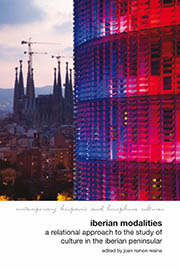Book contents
- Frontmatter
- Contents
- Preface
- List of Contributors
- Introduction: Iberian Modalities: The Logic of an Intercultural Field
- Part I Institutionalizing Iberian Studies: A Change of Paradigm
- Part II Theorizing Iberia
- Part III Iberian Dialogs
- Part IV From Sea to Iberian Sea
- 12 Immortality, Corruption, and the Sisè Seny: João de Barros's Empire of Language
- 13 The Iberian Problem: A Confederative Model for Pessoa's Heteronyms
- 14 Lisbon as Destination: Josep Pla's Iberianism through His Travels to Portugal
- Works Cited
- Index
14 - Lisbon as Destination: Josep Pla's Iberianism through His Travels to Portugal
from Part IV - From Sea to Iberian Sea
- Frontmatter
- Contents
- Preface
- List of Contributors
- Introduction: Iberian Modalities: The Logic of an Intercultural Field
- Part I Institutionalizing Iberian Studies: A Change of Paradigm
- Part II Theorizing Iberia
- Part III Iberian Dialogs
- Part IV From Sea to Iberian Sea
- 12 Immortality, Corruption, and the Sisè Seny: João de Barros's Empire of Language
- 13 The Iberian Problem: A Confederative Model for Pessoa's Heteronyms
- 14 Lisbon as Destination: Josep Pla's Iberianism through His Travels to Portugal
- Works Cited
- Index
Summary
Some years ago, in a lecture on the exhaustion of national literary history, Universidade de Lisboa professor Miguel Tamen argued for the privileged view of outsiders on a nation's culture. “Don't trust the natives!” he warned, advising against drawing systemic conclusions from the identification between point of view and object of study. Tamen's skepticism about national literary histories led him to assert that a literature is best represented by its foreign authors. His proposition opens up intriguing modalities of analysis. One would study not the Paris of Baudelaire or Zola but that of Benjamin or Rilke. Not the London of Dickens or Woolf, but that of Henry James and T.S. Eliot. Not the Barcelona of Oller or Rodoreda but that of Orwell or Genet. And so on, with interesting possibilities of alternative membership by authors who contributed to more than one country's literature. Although modalities for expressing the exotic are multiple, Tamen implicitly placed the onus on travel literature. It is often while traveling that an author feels the urge to describe a foreign culture or, if desire precedes the experience, then a writer will travel for the sake of a book yet to be written. Indeed, whether in documentary form or in fictional disguise (or in a mixture of both), travel has always been at the root of literary expression.
- Type
- Chapter
- Information
- Iberian ModalitiesA Relational Approach to the Study of Culture in the Iberian Peninsula, pp. 225 - 242Publisher: Liverpool University PressPrint publication year: 2013

